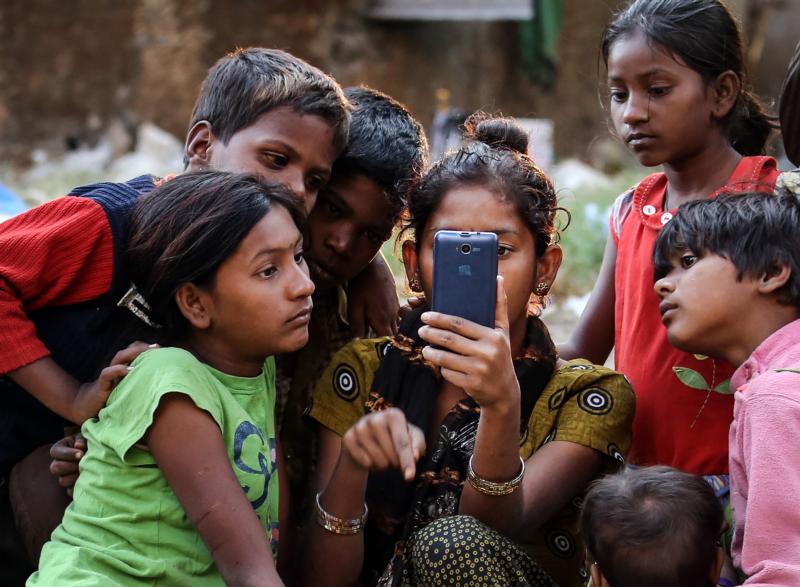
Indian children watch a movie on a cellphone on the roadside in Mumbai Jan. 20, 2016. (CNS photo/Divyakant Solanki, EPA)
WASHINGTON (CNS) — Parents must feel at times it’s a losing battle keeping screens out of their children’s hands, much less away from their eyes.
Seemingly out of the blue, however, the U.N.’s World Health Organization issued guidelines April 24 on screen time for young children. The upshot: No screen time for babies under a year old, and no more than one hour a day for children under age 5.
The guidelines may come as a relief for parents. They echo recommendations issued by a group no less prestigious than the WHO, but not as influential: the American Academy of Pediatrics. For children under 18 months of age, the only screen time the organization approves of is video chats. For children under 2, only “high-quality programming” should be watched — and with a parent, so children can understand what they’re seeing.
[hotblock]
The WHO guidelines were not issued in a vacuum. For babies, WHO recommend they spend at least 30 minutes a day on their stomachs, and for the under-5 set, the WHO guidelines call for three hours daily of physical activity. This combats sedentary habits that all too easily lead to obesity.
“Achieving health for all means doing what is best for health right from the beginning of people’s lives,” said Dr. Tedros Ghebreyesus, WHO director general, in an April 24 statement. “Early childhood is a period of rapid development and a time when family lifestyle patterns can be adapted to boost health gains.”
“Improving physical activity, reducing sedentary time and ensuring quality sleep in young children will improve their physical, mental health and well-being, and help prevent childhood obesity and associated diseases later in life,” said Dr. Fiona Bull, WHO program manager for surveillance and population-based prevention of noncommunicable diseases, in her own April 24 statement.
It’s still one thing for experts to advise something, and another for people to heed it.
“Sometimes, I think the public health community is a little tentative about putting out advice that might be hard for parents to swallow,” said Josh Golin, executive director of the Campaign for a Commercial-Free Childhood, in an April 29 telephone interview with Catholic News Service from Boston, adding that he thought the WHO guidelines were “fantastic.”
“We need to deliver some tough medicine to parents, even if it’s not what they want to hear,” Golin said.
He acknowledged, though, that it’s not entirely parents’ fault. “We live in a culture that makes it very, very hard for parents to limit screen time. Screens are falsely marketed as being educational,” Golin said. In effect, he added, they become “short-term babysitters.”
[tower]
Just because the WHO guidelines extend only to age 5 “doesn’t mean that there isn’t a lot of work to be done on 6-and-overs,” Golin said. “The more kids use screens early, the more they’ll use them in later life,” which then cuts down on their capacity to “play creatively, to work through their own boredom. They just can’t always say, ‘Mom or Dad, I’m bored,’ or they’ll never develop those inner resources.”
The guidelines came less than a week before the start of the organization’s annual “Screen-Free Week,” which began April 29, running through May 5. Jean Rogers, director the Children’s Screen Time Action Network, told CNS April 26 that it’s only coincidence that it takes place at the same time as the start of the May network television ratings “sweeps.”
There are enough reasons to cut down on screen usage. “Media multitasking is exacerbating ADHD,” Rogers told CNS. There are also plenty of ways to find alternatives to being continuously connected. The website https://www.screenfree.org/resources/ has far more than a week’s worth of ideas in English, Spanish and, now, French.
“Faith leaders are not necessarily saying much or aware of the screen time issues that are pulling children apart,” Rogers said. However, the Children’s Screen Time Action Network is planning an interdenominational webinar for late summer called “An Interfaith Conversation About Screen Time.”
Not that everyone must totally renounce screens entirely during Screen-Free Week. Families can choose a different week, Rogers said. Further, the focus is to “unplug from entertainment screens. We know parents need screens to work,” she added. Kids may need screens for homework, but not necessarily for social media or playing Fortnite.
Even for the professional, it can be a challenge. “In my family,” Rogers said, “we have a hard time turning off the baseball. We should be listening to it on radio this week — the old-fashioned way.”
PREVIOUS: Archbishop Gregory shares memories, asks for prayers from Atlanta
NEXT: Kentucky Derby draws attention to issue of human trafficking



Share this story